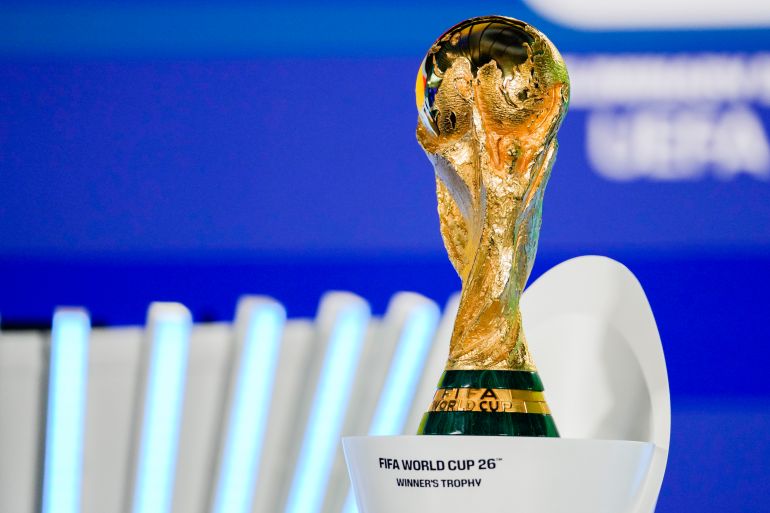England to face Serbia in European qualifying for 2026 World Cup
The draw for the European qualifiers for the 2026 FIFA World Cup has pitted England against Serbia in the group stage.
The FIFA World Cup 26 trophy is displayed during the UEFA Preliminary Draw at FIFA headquarters in Zurich, Switzerland [Martin Meissner/AP]Published On 13 Dec 202413 Dec 2024
England will renew acquaintances with Serbia in the European qualifying competition for the 2026 World Cup after the draw was made in Zurich on Friday, with Albania drawn in the same group, setting up a politically charged encounter between the Balkan nations.
However, many teams remain in the dark over their group opponents.
The draw procedure means that eight groups are not yet fully decided, as they will contain either the winners or losers of the Nations League quarterfinals, which take place in March of next year.
Spain take on Netherlands in their Nations League quarterfinal, and the winner will join Turkiye, Georgia and Bulgaria in Group E while the losing team goes into Group G alongside Poland, Finland, Lithuania and Malta.
World Cup 2022 runners-up France are also involved in a Nations League quarterfinal, playing Croatia, and if they win that they will go into Group D with Ukraine, Iceland and Azerbaijan.
England are one of only four top-seeded countries who know their fate, and under new manager Thomas Tuchel, who takes charge on January 1, they will take on Serbia, Albania, Latvia and Andorra in Group K.
England head coach Thomas Tuchel arrives at the draw [Martin Meissner/AP]
At this year’s European Championship, England beat Serbia 1-0 in their opening group game before going on to reach the final which they lost 2-1 to Spain.
Advertisement
The group contains a possible flashpoint with Serbia and Albania set to face each other twice, after the Balkan feud came to the fore again at Euro 2024.
For political reasons, Ukraine and Belarus could not be drawn into the same group, as with Gibraltar and Spain. Kosovo were kept apart from Serbia and Bosnia, but no such restrictions were placed on Serbia and Albania.
Serbia still does not recognise the mainly ethnic Albanian nation of Kosovo’s independence after one of the bloodiest of the 1990s post-Yugoslavia Balkan wars.
At Serbia’s Euros match against England, Kosovar journalist Arlind Sadiku made a double-headed eagle gesture – the symbol of Albania’s flag – to Serbian fans during a live broadcast, and had his credentials rescinded by UEFA.
UEFA also imposed punishments after fans of Albania and Croatia joined together in chants of “Kill the Serbs” and Serbian supporters chanted “Kosovo is the heart of Serbia” and displayed a flag with Kosovo inside Serbia’s borders.
A similar flag led to a FIFA fine for Serbia at World Cup 2022, after the players hung the flag in their dressing room for their game with Brazil.
In 2014, a Euro qualifier between Serbia and Albania was abandoned following a brawl between players after a flag, depicting so-called Greater Albania, an area covering all parts of the Balkans where ethnic Albanians live, was flown over the stadium.
Last month, Romania were awarded a 3-0 win over Kosovo when the game was abandoned after the Kosovo players left the field when they heard pro-Serbian chanting from the home fans.
France head coach Didier Deschamps talks to the media at the draw [Martin Meissner/AP]
The 2026 World Cup will be played in the US, Canada, and Mexico, kicking off on June 11 with the final on July 19, and will be the first to include 48 teams, expanded from 32.
Advertisement
Europe will have 16 places at the tournament, up from 13 at the last World Cup and the 12 group winners qualify automatically.
The 12 group runners-up go into the playoffs along with the four best-ranked group winners of the 2024/25 UEFA Nations League that did not finish in first or second place in the European Qualifiers group stage.
Group A
Winner Nations League quarterfinal Germany/Italy, Slovakia, Northern Ireland, Luxembourg
Group B
Switzerland, Sweden, Slovenia, Kosovo
Group C
Loser Nations League quarterfinal Portugal/Denmark, Greece, Scotland, Belarus
Group D
Winner Nations League quarterfinal France/Croatia, Ukraine, Iceland, Azerbaijan
Group E
Winner Nations League quarterfinal Spain/Netherlands, Turkiye, Georgia, Bulgaria
Group F
Winner Nations League quarterfinal Portugal/Denmark, Hungary, Ireland, Armenia
Group G
Loser Nations League quarterfinal Spain/Netherlands, Poland, Finland, Lithuania, Malta
Group H
Austria, Romania, Bosnia, Cyprus, San Marino
Group I
Loser Nations League quarterfinal Germany/Italy, Norway, Israel, Estonia, Moldova
Group J
Belgium, Wales, North Macedonia, Kazakhstan, Liechtenstein
Group K
England, Serbia, Albania, Latvia, Andorra
Group L
Loser Nations League quarterfinal France/Croatia, Czech Republic, Montenegro, Faroe Islands, Gibraltar
Qualifying matches start in March next year and will be played through until November, and teams will play each other home and away.
